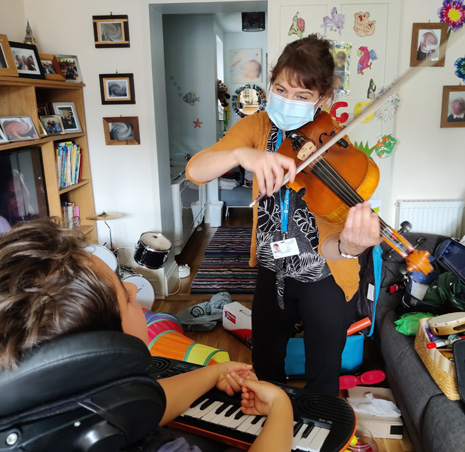
Jessie’s Fund established music therapy for children at York Hospital and at the Great North Children’s Hospital (GNCH), in Newcastle. The work is varied, as we hear first from Aby Vulliamy, at York Hospital, and then from Clare Hunt, at the GNCH.
I was very happy to commence the role of Music Therapist in the Paediatric Psychology Department in Child Health at York Hospital in December 2021. I wondered how my psychodynamic and musical approach would work within a hospital setting, but I’ve been so warmly welcomed and encouraged by all my colleagues within the multi-disciplinary team, who seem really excited to have this unique aspect to the services they can offer their children and families.
I quickly received several referrals ranging in age from 11 months to 15 years. I now have a busy community-based timetable, working in family homes and schools. I have created the following anonymized and amalgamated vignettes to illustrate the type of work I have been doing.
‘Anna’ is an 8-year old girl with epilepsy who’s mum died suddenly 2 years ago. Anna shows separation anxiety, difficulty sleeping and difficulties making friends. I visit Anna at her school, where we use musical interactions such as turn-taking, conducting and improvising to develop her social, emotional and communication skills, confidence and ability to negotiate and co-operate. We’re also doing storytelling-through-music to help Anna process her loss after her bereavement. Anna really appreciates her therapy, frequently checking ‘how many sleeps’ till the next session. During the summer break, I did some dyadic work with Anna and her dad to help Anna communicate her feelings more clearly before they become overwhelming.
‘Orla’ is an 11-year old girl with very complex health and communication needs which developed when she was 6. Orla’s physical movement is now extremely limited, with her ability to blink being the only independent movement she can make. Orla cannot leave her bedroom, apart from visits to the hospital.
The cross-modality and multi-sensory nature of music makes it hugely powerful for Orla, who has no expressive language. Music carries and conveys strong feelings, enabling me to attempt to ‘attune’ with Orla via the music. Orla shows her pleasure and attentiveness by listening and watching carefully and sometimes vocalising as she exhales. Music Therapy means a lot to Orla and her family, in terms of Orla’s emotional well-being and social/communication opportunities and the families’ ability to process their feelings in relation to Orla’s illness.
We are now working on establishing music therapy provision on the wards. I’m really loving working for York Hospital. The young people and families are hugely inspiring and I’m learning a huge amount from them and from my colleagues every week.
Aby Vulliamy
The work at the Great North Children’s Hospital in Newcastle (GNCH) is very different in nature to the York hospital’s work, as all the music therapy takes place within the hospital. I am based within the Bridges School at GNCH, although I am managed within the psychology team.
In a hospital setting, young people have very little control over any aspects of their lives, so creating a space in which they can be creative and have control within our shared music making is powerful. Some young people have received regular weekly music therapy over several months, due to a long stay in hospital. Others have received only one or two sessions of therapy. Some sessions involve parents or other family members, or other school staff members if there are specific ways in which extra support is needed, such as support in playing instruments.
I will share ‘Leo’s’ story (not his real name). Leo is 13 years old and has been in hospital for over 6 months. He has an acquired brain injury and epilepsy. It was noted in information from the school that Leo has been depressed, so the aims of sessions have been to lift his mood and offer therapeutic support through the difficulties of his ongoing medical treatment.
The sessions take place at the bedside within a bay, shared with two other children, meaning that the music has needed to remain at a relatively quiet level throughout. The ongoing sessions have reflected both Leo’s mood and his physical health. Within some sessions Leo has smiled and laughed, visually tracking me and the instruments and showing recognition of songs. His love for Disney songs has provided a connection, enabling us to establish the therapeutic relationship.
Over time, I have introduced more improvised music, motivating Leo to vocalise and engage more fully in our shared musical experience. On other occasions, if Leo has been particularly unwell, it has been important to simply be with him in the space, supporting musically. Instruments used within sessions have included guitar, violin, lyre harp (a particular favourite due to the portability and vibrations) and iPad, with Garageband guitars and drums.
This is a rewarding and valuable role which I am so thankful to Jessie’s Fund for providing. Early on a physiotherapist commented ‘it’s so lovely to hear music on the ward’ and parents and carers have expressed how pleased they are that their children have been able to access something so positive and engaging whilst in hospital.
Clare Hunt



